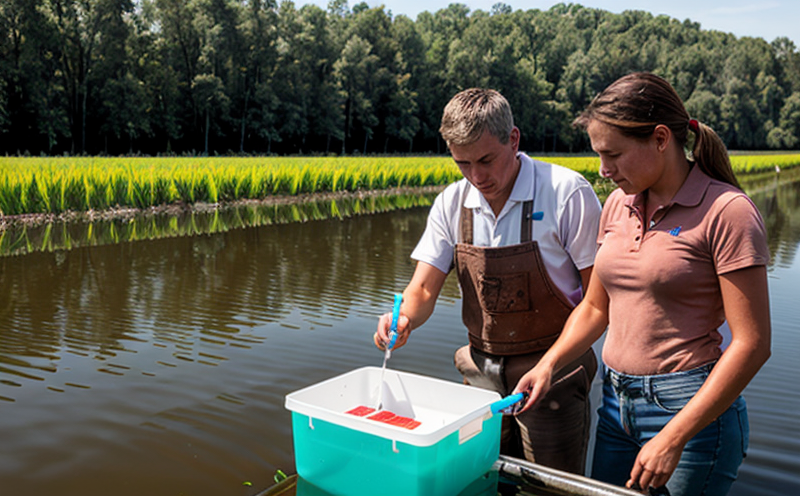Zinc Content Testing in Agricultural Water
Water quality testing is a critical component of agricultural production. Zinc content testing ensures that water supplies used for irrigation are within safe limits to avoid contamination and harm to crops, livestock, and the environment. This service focuses on determining the zinc content in agricultural water samples with precision and accuracy.
Zinc plays a significant role in plant nutrition; it is essential for photosynthesis and enzyme activation. However, excess zinc can be toxic to plants, leading to stunted growth or even death. Therefore, testing the zinc content of irrigation water ensures that crops receive just enough nutrients without suffering from toxicity.
The importance of this test extends beyond agriculture. Zinc contamination in agricultural water can also affect livestock health and pose risks for workers handling treated water. By conducting regular zinc content tests, farmers can make informed decisions about their irrigation practices to maintain soil fertility and crop quality while minimizing environmental impact.
Our laboratory uses state-of-the-art instrumentation and follows internationally recognized standards such as ISO 6878:2019 and ASTM D5453-19. The process begins with the collection of water samples from various points in the irrigation system, ensuring a representative sample for analysis.
Sample preparation involves dilution to appropriate concentrations suitable for the analytical method used. The method chosen here is atomic absorption spectrophotometry (AAS), which provides highly accurate results for trace metals like zinc. This technique measures the absorption of light by free atoms in the gaseous state, making it ideal for determining metal content.
After analysis, our team generates a detailed report providing the zinc concentration levels found in ppm (parts per million). Compliance with local and international standards is crucial; hence we adhere strictly to guidelines such as EU Directive 2008/56/EC regarding water quality parameters. Our reports are designed to assist clients in making informed decisions about their irrigation practices.
Understanding the zinc content in agricultural water helps farmers optimize their crop yields, protect their investments, and contribute positively to environmental sustainability efforts. By leveraging this service, businesses can enhance operational efficiency, ensure product safety, and comply with regulatory requirements.
Scope and Methodology
The scope of zinc content testing in agricultural water encompasses a range of parameters that influence the accuracy and reliability of the test results. These include the collection methods for water samples, preparation techniques, and the analytical approach employed.
- Sample Collection: Samples are collected from different points within the irrigation system to ensure representativeness. This includes surface water sources like rivers or lakes connected to the irrigation network. Proper collection practices minimize contamination risks associated with improper handling.
- Preparation: Collected samples undergo dilution if necessary, ensuring they fall into a range suitable for accurate analysis by AAS.
- Analytical Approach: Atomic absorption spectrophotometry is used due to its sensitivity and precision in measuring trace amounts of zinc.
The methodology adheres strictly to international standards like ISO 6878:2019, ensuring consistent and reliable results. Our team follows these protocols meticulously to provide accurate measurements and interpretations.
| Parameter | Description | Units |
|---|---|---|
| Zinc Concentration | Determines the amount of zinc present in agricultural water samples | ppm (parts per million) |
| Sample Collection Points | Variety of points within irrigation systems, including surface water sources | - |
| Analytical Technique | Atomic absorption spectrophotometry (AAS) | - |
These parameters and methods ensure the accuracy and reliability of zinc content testing, providing valuable insights into water quality.
Why Choose This Test
- Compliance: Ensures adherence to local and international regulations regarding water quality.
- Precision: Utilizes advanced techniques like atomic absorption spectrophotometry for accurate measurements.
- Risk Management: Identifies potential risks associated with zinc contamination in agricultural water, allowing for timely interventions.
- Sustainability: Contributes to sustainable farming practices by optimizing nutrient use and protecting the environment.
Zinc content testing is essential for maintaining optimal crop health and productivity. By identifying zinc levels early on, farmers can adjust their irrigation schedules and fertilizer applications accordingly, reducing the risk of overuse or underuse of nutrients.
Additionally, this test helps in minimizing environmental pollution by preventing excessive zinc from leaching into groundwater systems. This not only protects natural resources but also ensures compliance with stringent environmental protection laws.
Use Cases and Application Examples
- Irrigation Water Optimization: Farmers can use test results to fine-tune their irrigation practices, ensuring plants receive optimal zinc levels.
- Diagnostics: Identifies potential issues with water sources used for agriculture before they cause significant damage.
- Livestock Health Monitoring: Ensures that livestock have access to safe drinking water by monitoring zinc content in irrigation water.
- Sustainability Initiatives: Supports sustainability efforts by promoting efficient use of resources and reducing environmental impact.
| Use Case | Description |
|---|---|
| Irrigation Water Optimization | Farmers can adjust their irrigation schedules based on zinc content levels to optimize nutrient use and crop health. |
| Diagnostics | Identifies potential issues with water sources before they cause significant damage, allowing for timely interventions. |
| Livestock Health Monitoring | Maintains the safety of drinking water by monitoring zinc content, ensuring livestock health and well-being. |
| Sustainability Initiatives | Supports sustainability efforts by promoting efficient use of resources and minimizing environmental impact. |
These applications highlight the versatility and importance of zinc content testing in agricultural water. By leveraging this service, businesses can enhance operational efficiency, ensure product safety, and comply with regulatory requirements effectively.





